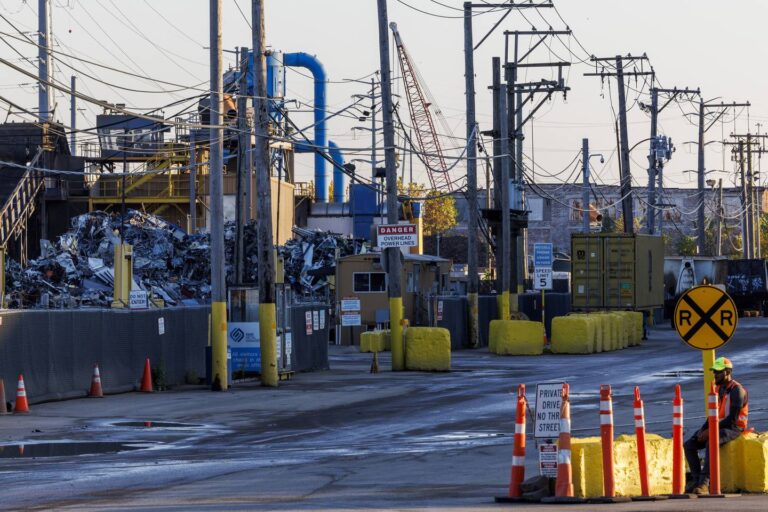On the Southeast Side, residents were successful in their campaign to get the city to deny a permit that would have allowed a scrap metal shredder to open in their neighborhood. In Pilsen, residents are fighting a similar — but potentially more difficult — battle against Sims Metal Management, owner of a shredder that has operated in the neighborhood since the ‘90s.
Now, some are saying the total effects of past and present actions by industries need to be taken into account in communities like Pilsen.
Advertisement
“One big element that was missing here was the cumulative impact effects of yet another license that is being renewed in one of the most polluted areas in the city and in the country,” said Ald. Byron Sigcho-Lopez, 15th, who filed a resolution last month, sponsored by more than 15 members of City Council, calling on the city to include a cumulative impact study of the neighborhood in its review of Sims’ permit application.
Sims Metal Management has been under fire for years for failing to provide data about emissions at its metal recycling operation at 2500 S. Paulina St. In April, the U.S. Environmental Protection Agency mandated that Sims install air monitors and report its data starting this fall to determine the facility’s compliance with the Clean Air Act. But last week, the EPA said the monitoring equipment “did not work as designed” in the early testing results from Sept. 23 through Sept. 30.
Advertisement
Meanwhile, Sims’ application for permit renewal is in limbo as the city waits on “reliable data” from the EPA so it can hold a public community meeting on the permit, according to a statement from the city Department of Public Health.
Residents — who were already distrustful of Sims’ transparency after it was sued by Illinois Attorney General Kwame Raoul last year for alleged “uncontrolled emissions” — now must wait until December for the results from October testing. The repeated struggles to collect data from Sims have led advocates to doubt the city’s ability to capture the total impact of pollution in Pilsen.
Mary Gonzales, a Pilsen resident and chairperson of the social justice committee at St. Paul Catholic Church, said the goal of this movement on the Southwest Side is to illustrate flaws in the permitting process through the example of Sims.
“If we slow down Sims, the other polluters will start saying ‘holy crap, we have to do something,’ ” Gonzales said. “But it could be MAT Asphalt, it could be Sims, it could be Oremus … Sims created the opportunity because they were such tremendous violators that the attorney general had to sue them.”
A spokesperson for Sims said Wednesday that the company has added “additional checks” to its air monitoring equipment as required by the EPA. “We believe the issues have been resolved,” the spokesperson said in an email.
While the city has not shared plans to conduct a specific cumulative study of pollution in Pilsen, it is working on a citywide cumulative impact assessment. But that review is not estimated to be completed until mid-2023.
“One thing that’s become clearer and clearer to us is the lack of any description, identification, rulings ― anything related to overburdened communities in Chicago, the state of Illinois and in the nation,” Gonzales said. “We’re not alone.”
Sims’ city operating permit expired in November 2021, the same month the facility applied for a renewal. However, this renewal requires Sims to come into compliance with the city’s rules for large metal recycling facilities, which went into effect in June 2020. Some of these requirements include noise monitoring and stricter regulations on emissions.
Advertisement
But organizations in Pilsen want the city to shut down the facility because of concerns that emissions from the facility are contributing to higher rates of asthma and other health issues. Last month, around 50 people marched from Benito Juarez Community Academy to Sims, chanting “no justice, no peace” and carrying signs stating “Sims Must Go!”
On the Southeast Side, the city denied RMG’s permit application for a metal recycling facility after finding that potential changes in air quality and quality of life for the surrounding communities presented an “unacceptable risk.” The health department noted in February that “this level of impact assessment would not be required for existing businesses.”
But Sigcho-Lopez’s resolution calls for the city to take similar, if not more comprehensive, steps through a cumulative impact study.
A cumulative impact study takes into consideration how effects of past and present actions by industries add up in a community. Currently, permitting processes take into consideration the emissions and impact of a facility as a single source, without factoring in existing pollution in the area, said Michael Cailas, an associate professor of environmental and occupational health sciences at the University of Illinois at Chicago.
“It makes sense, because, legally, if you’re applying for a permit, you cannot be blamed for the pollution that your neighbor is causing,” Cailas said. “And that’s where the whole problem starts — there’s no framework that will have in mind the overall accumulated level of pollution when it comes to a permit right now.”
Cailas, who has worked on reports requested by residents in the Southwest Side, said industries can be well below emission limits, but when they are concentrated in one area, it can add up and affect human health.
Advertisement
Under this equation, the Southwest Side is the most overburdened area of the city, home to most of the asphalt plants and rail yard support facilities, according to a report from UIC.
Cailas said there is currently no standard federal methodology for conducting these assessments. The U.S. EPA Office of Research and Development is prioritizing cumulative impact research in its plans for the next three years.
Like Sigcho-Lopez, the Southwest Environmental Alliance, a coalition of people fighting for environmental justice in the area, is also calling for a cumulative impact study to be included in the city’s review of Sims’ permit. Gonzales, who is 81, lives in Pilsen on a side street close to St. Paul Catholic Church. Recently, she said she saw from her front window two semi-trucks pass by her house within 10 minutes.
“They don’t belong on my street,” she said.
[ Little Village and Southeast Side residents demand the city take action on polluters ]
The coalition, of which Gonzales is a member, is meeting with politicians across different levels of government aiming to get them to agree to work toward changing these permit processes, which first starts with defining what an environmental justice community is, she said. For Gonzales, that means ensuring her community is “carrying its fair share of burden, and not carrying everybody else’s.”
The coalition has been advocating for H.B. 4093, which stalled this year. This bill would define an environmental justice community and implement permit application provisions for industries that release emissions into the community’s air.
Advertisement
“They have to close the door here on the Southwest Side to stop letting in polluters,” said Theresa McNamara, chairperson of the Southwest Environmental Alliance.
Since late September, the Sims facility has had several monitors stationed around its fence line, measuring the ambient air for several types of pollutants, including particulate matter, metal hazardous air pollutants and volatile organic compounds.
Based on early testing results, the EPA said on Nov. 4 that it is concerned that the monitoring equipment for particulate matter and metal air pollutants — such as cadmium, mercury and lead — didn’t work as it was meant to. The monitoring equipment may have pulled in too little or too much air, which could invalidate any results, as the rate of air flow influences the concentration of pollutants, according to the EPA.
The EPA visited Sims last week to provide technical assistance and gather information on the equipment, the agency said in a statement to the Tribune.
Sims’ data from October is due to the EPA by Nov. 30.
The EPA’s review of this data now plays a role in the city’s review of the recycling facility’s permit application. A spokesperson for the health department said in a statement that it is being “deliberate and rigorous” in its review of Sims’ renewal application and that it “will not move forward” in the process without this data. The department also described its cumulative study on the city’s pollution as a “longer term” goal.”
Advertisement
The study aims “to mitigate the historical and present impacts of polluting industries within communities,” the health department said in a statement. The data will illustrate where pollution is coming from and how burdens vary across the city.
At a public meeting hosted by the coalition last month, the health department’s managing deputy commissioner, Megan Cunningham, said the study will help inform the city’s policy and investment decisions, including the development of an ordinance addressing zoning and permitting actions, which will require “systemic change” across all levels of government.
Afternoon Briefing
Daily
Chicago Tribune editors’ top story picks, delivered to your inbox each afternoon.
“CDPH cannot change zoning law all on our own,” Cunningham said at the meeting.
Months away from the mid-2023 target for completing its baseline assessment, Sigcho-Lopez said he hopes the Pilsen resolution brings a sense of urgency to the need for “due process” in the permitting process.
He said he hopes it will set a precedent for how Chicago can evaluate industries operating in vulnerable areas, including long-standing ones.
“We strongly believe that this is an opportunity for us to start addressing the environmental racism that has been in our community and in our city for far too long,” he said.
Advertisement
Gonzales said she knows that an overhaul of permitting processes will take time.
“I do not believe that I will live long to see everything that needs to be done,” she said. “But I also believe that there’s a lot of people beginning to become engaged.”







